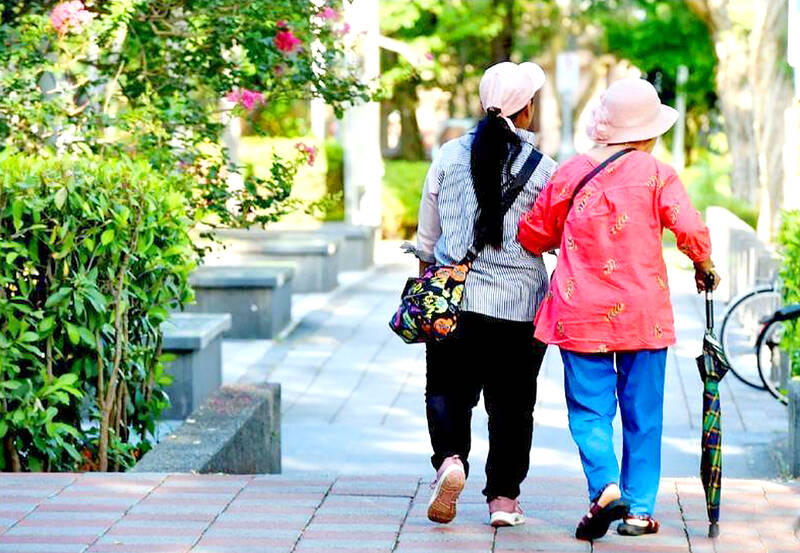More than 23 percent of people aged 65 or older live alone, while about 12 percent care for an elderly family member, the Ministry of the Interior said, as it forecast Taiwan to become a “super-aged society” by next year.
As of the end of last year, 4.3 million people in Taiwan were older than 65, or 18.35 percent of the population, ministry data showed.
A society is considered super-aged when more than 20 percent of the population is aged 65 or older. Taiwan became an “aged society” at the end of March 2018.

Photo: Taipei Times file
The ministry data showed that of those 65 or older, 54.8 percent were women and 45.2 percent were men, while of those 75 or older, 57.8 percent were women and 42.2 percent were men.
As of June last year, nearly 4.19 million people were considered elderly, of which 976,925 lived alone (23.3 percent) and 517,770 cared for an elderly family member (12.36 percent).
Elderly women and those caring for elderly family members outnumbered the male group, while more elderly men lived further from medical services, bus stops and convenience stores.
The ministry data showed that as of June last year 22.76 percent of women aged 65 to 74 and 26.12 percent of women aged 75 or older lived alone, compared with 22.71 percent and 21.98 percent of the male groups respectively.
Within the 65-to-74 age group, more women (12.43 percent) than men (11.30 percent) were caring for an elderly family member, known as “double aging care,” while men (17.77 percent) outnumbered women (9.83 percent) within the 75-or-older age group.
The data showed that 13.17 percent of elderly people lived in walk-up apartments, of which 13.6 percent were women and 12.66 percent men.
Of people aged 65 or older living in walk-up apartments, 14.82 percent were women living alone and 12.49 percent were women who were caring for an elderly family member, compared with 12.09 percent and 12.1 percent for the respective male groups, despite a higher percentage of men (11.22 percent) than women (10.51 percent) caring for an elderly family member within the 75-or-older age group.
As of June last year, 54.05 percent of elderly people lived within 200m of medical facilities, while 36.78 percent lived within 100m of a bus stop and 33.64 percent lived within 100m of a convenience store, up from 53.32 percent, 36.76 percent and 31.69 percent respectively in 2019.
Among elderly women who lived alone, 59.84 percent resided within 200m of medical facilities, 40.21 percent within 100m of a bus stop and 38.3 percent were within 100m of a convenience store, all higher than their male counterparts who lived alone at 53.52 percent, 38.33 percent and 33.75 respectively.
The data showed that 81.6 percent of elderly people lived within 1km of medical facilities, 91.9 percent within 500m of a bus stop and 81.33 percent within 500m of a convenience store, up from 2019’s 80.41 percent, 90.61 percent and 79.03 percent respectively.
Of those without access to medical facilities within 1km, or bus stops or convenience stores within 500m, 20.66, 8.5 and 21.11 percent were men respectively, all higher than their female counterparts’ 14.26, 5.64 and 14.34 percent respectively, the data showed.

The Ministry of the Interior (MOI) is to tighten rules for candidates running for public office, requiring them to declare that they do not hold a Chinese household registration or passport, and that they possess no other foreign citizenship. The requirement was set out in a draft amendment to the Enforcement Rules of the Public Officials Election and Recall Act (公職人員選舉罷免法 ) released by the ministry on Thursday. Under the proposal, candidates would need to make the declaration when submitting their registration forms, which would be published in the official election bulletin. The move follows the removal of several elected officials who were

The Republic of China (ROC) is celebrating its 114th Double Ten National Day today, featuring military parades and a variety of performances and speeches in front of the Presidential Office in Taipei. The Taiwan Taiko Association opened the celebrations with a 100-drummer performance, including young percussionists. As per tradition, an air force Mirage 2000 fighter jet flew over the Presidential Office as a part of the performance. The Honor Guards of the ROC and its marching band also heralded in a military parade. Students from Taichung's Shin Min High School then followed with a colorful performance using floral imagery to represent Taiwan's alternate name

FOUR DESIGNATED AREAS: Notices were issued for live-fire exercises in waters south and northwest of Penghu, northeast of Keelung and west of Kaohsiung, they said The military is planning three major annual exercises across the army, navy and air force this month, with the navy’s “Hai Chiang” (海強, “Sea Strong”) drills running from today through Thursday, the Ministry of National Defense said yesterday. The Hai Chiang exercise, which is to take place in waters surrounding Taiwan, would feature P-3C Orion maritime patrol aircraft and S-70C anti-submarine helicopters, the ministry said, adding that the drills aim to bolster the nation’s offshore defensive capabilities. China has intensified military and psychological pressure against Taiwan, repeatedly sending warplanes and vessels into areas near the nation’s air defense identification zone and across

A Chinese takeover of Taiwan would severely threaten the national security of the US, Japan, the Philippines and other nations, while global economic losses could reach US$10 trillion, National Security Council Deputy Secretary-General Lin Fei-fan (林飛帆) wrote in an article published yesterday in Foreign Affairs. “The future of Taiwan is not merely a regional concern; it is a test of whether the international order can withstand the pressure of authoritarian expansionism,” Lin wrote in the article titled “Taiwan’s Plan for Peace Through Strength — How Investments in Resilience Can Deter Beijing.” Chinese President Xi Jinping’s (習近平) intent to take Taiwan by force